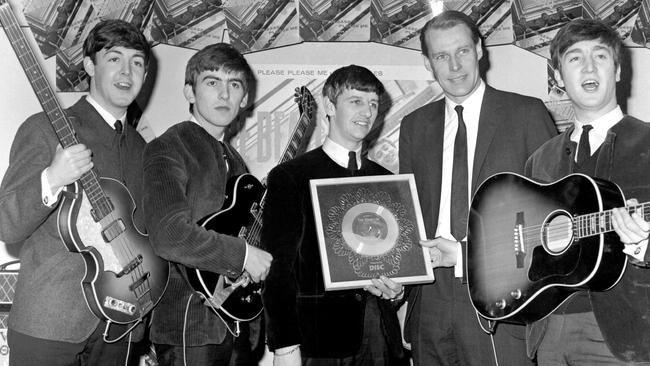End of long, winding road for fifth Beatle George Martin
Legendary producer George Martin, known as the fifth Beatle for his influence on the group, has died aged 90.

Fittingly, it was a recording that changed George Martin’s life.
Not a hit song — he would go on to produce 30 British and 28 US No 1 singles, mostly by the Beatles — but a recording of his own voice. The first time he heard his robust Cockney accent, and keenly aware of its rigid London working-class implications, he knew it had to change. He took elocution lessons. They worked. When he met John Lennon, Paul McCartney and George Harrison at the famed Abbey Road Studios on June 6, 1962, they considered Martin, with his by then clipped BBC accent, a “toff”.
Martin, getting a name for himself as a producer of comedy records for the likes of the Goons, Bernard Cribbins, Charlie Drake and Rolf Harris, was on the lookout for “a pop act, a new Cliff Richard”. The Beatles took him by surprise.
Their songwriting skills he considered modest — perhaps one song in their set, Love Me Do, could be worked on — but their irreverent humour won him over.
The band played the songs they knew best — after engineer Norman Smith tied string around Lennon’s amplified guitar to stop it rattling — and Martin hurriedly recorded them. He played the tracks back to the young men who, with Martin, and within two years, would change the course of 20th-century music. “Tell me if there’s anything you don’t like,” he said as the tape rolled.
“Well, I don’t like your tie, for a kick off,” responded the 19-year-old guitarist Harrison.
An immediate bond formed; the equally quick-witted Martin appealed to the Liverpool quartet who, having been turned down by every major label, understood that Martin wasn’t just their best chance, he was their only chance.
In Martin’s biography, Playback, published in 2002, he finally admitted that it was he who told Beatles manager Brian Epstein that the band’s drummer, Pete Best, had to go. Within weeks the band was back to record their first single, with new drummer Ringo Starr. The world’s most famous band was complete.
Martin, who died yesterday, aged 90, was a success long before the Beatles crossed his path, but neither they nor Martin would be household names but for Epstein’s persistence and Martin seeing something in a bunch of leather-clad young men others had not. The Beatles’ journey across the music in the 1960s took them from the irresistible pop simplicity of She Loves You to the genre-busting Sgt Pepper’s album — the most influential in rock and roll — in just four years. It is inconceivable that they would have charted that course without Martin’s ability to create in the studio the sounds dreamt up by Lennon and McCartney, for whom musical notation was just “dots”.
“I want this to sound like the colour purple,” Lennon once instructed Martin. Only Martin knew what that meant.
Martin was a partly taught, but quite accomplished musician. When McCartney hummed the notes he wanted for the harp on She’s Leaving Home, Martin wrote out the notation. He did so again when McCartney had a melody for Penny Lane, and Martin had it played on piccolo, an unlikely instrument for a pop song in 1967.
Martin went on to successfully produce many other acts: America, Jeff Beck, Cilla Black, Matt Monro, Gerry & The Pacemakers, Neil Sedaka and Celine Dion among them.
Some of them hoped some of his Beatles magic might rub off. Others thought he might share their creativity. Sometimes it worked.
Within hours of the funeral for Princess Diana in 1997 he was back at Abbey Road to produce Elton John’s tribute song Goodbye England’s Rose. It has gone on to sell more than 33 million copies, the most successful single of all time. Attending the Beatles’ Hollywood Bowl concert in California in 1964, at the height of Beatlemania, a young fan Martin guessed to be about 12 looked back at the conservatively dressed Englishman behind him.
“Aren’t you a bit old to be here?” he cheekily inquired.
Martin was 38. No one knew it, but he had just begun.




To join the conversation, please log in. Don't have an account? Register
Join the conversation, you are commenting as Logout